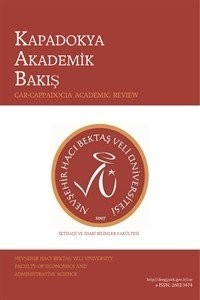
Kapadokya Akademik Bakış
Yazarlar: Elma SATROVİC
Konular:İktisat
Anahtar Kelimeler:Financial development,Human capital,ARDL,Bounds test
Özet: The impact of human capital on financial development has not been studied quite extensively in up-to-date studies. Hence, this article tries to fill in this gap by exploring the impact of human capital on financial development in Turkey. Human capital is expected to have a positive impact on financial development since it reduces information asymmetry. In addition, it is expected to increase demand for financial services and instruments. This article investigates the long-run and short-run relationship between financial development and human capital in Turkey using ARDL approach. Data are collected over 30-years period (1986-2015). In order to estimate the relationship between these economic terms, financial development is approximated using two proxy variables: broad money (% of GDP) and liquid liabilities (% of GDP). Two proxy variables of financial development are used in order to check for the sensitivity of the results. In addition, the impact of gross capital formation (% of GDP) is controlled. The obtained results indicate a significant positive impact of human capital on broad money (% of GDP) as well as on liquid liabilities (% of GDP) in both, short- and long-run. Control variable is not reported to be significant. Pesaran/Shin/Smith ARDL bounds test confirms the existence of a long-run relationship.
Dergi editörleri editör girişini kullanarak sisteme giriş yapabilirler. Editör girişi için tıklayınız.